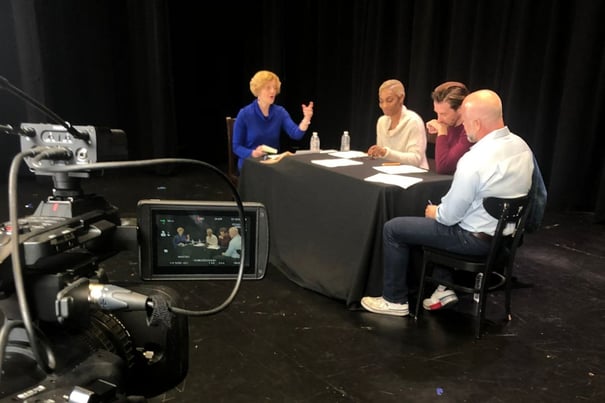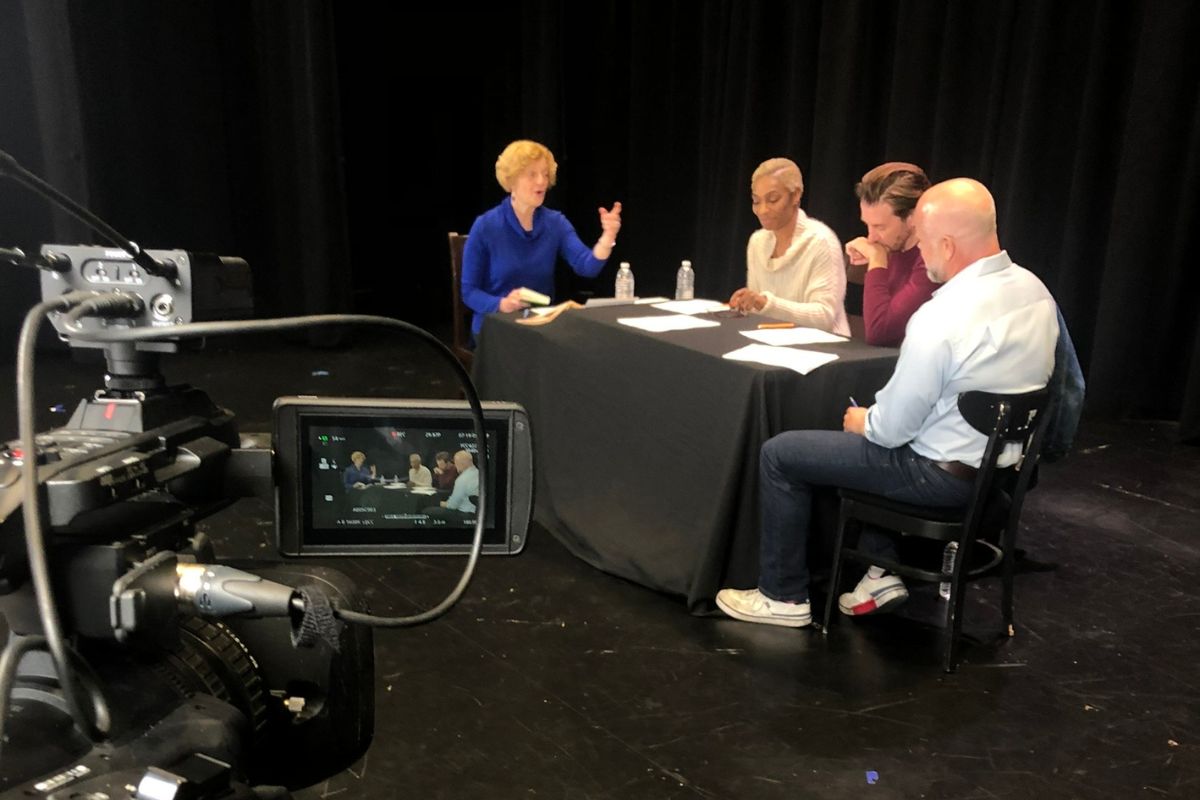14 April 2023
How to rehearse Greek Tragedy, with Carey Perloff
Carey Perloff
Director, playwright, producer and author.
Have you ever wondered exactly what goes on behind the closed doors of the rehearsal room? The process can seem mysterious and hard to explain or predict, particularly when the rehearsal involves something as challenging as Greek tragedy. Also, rehearsals can be very vulnerable for actors – they demand a great deal of trust and some degree of privacy. I’d always been careful about exposing artists to public scrutiny while they were still exploring. Yet I longed to share the process in a way that could teach other people how the whole thing works.
'Let’s keep the process alive and evolving.'
I wrestled with this question for all the years that I ran the American Conservatory Theater in San Francisco, but it was only when Covid hit that an idea came to me. What would happen if we opened up the creative process by sharing rehearsals on Zoom with whoever wanted to watch? How would actors react if I asked them to investigate the hardest scenes in classical drama from the safety of their own living rooms, while I directed them from mine? In part, this idea appealed to me because I spent the early days of my career addicted to the John Barton television series Playing Shakespeare, one of the best guides ever to approaching classical plays from a practical perspective. Barton’s multi-part tv series, accompanied by a book with the same title, brought together a company of remarkable actors and put them through exercises designed to unlock the secrets of Shakespeare. I adored Barton’s sessions because they were both pragmatic and inspiring—as a young director, they made me want to dig more deeply into theatrical texts while revelling in the alchemy that actors bring to the rehearsal process. I felt that I’d been given a window into a secret world.
So in the spring of 2020, with no prospect of live rehearsals for the foreseeable future, I started hosting free Zoom rehearsals through the auspices of the San Francisco Playhouse and the Fine Arts Museums of San Francisco. Each session lasted an hour and explored, moment-to-moment, one scene of a great play, from Chekhov’s Seagull to Ibsen’s Ghosts. Eventually, we became fixated on the Greeks, diving into the deep end with the first Jocasta-Oedipus scene in Oedipus Tyrannos, trying to sort out the arguments, the discoveries, the basic “givens” of the text, and the emotional undercurrents hidden beneath a very formal surface. The audience watching could ask questions in the Chat (“Do you think she intuits that she’s his mother?” “Is he remorseful for having killed Laius?”) and we tried to show them how choices get made, how the character gets developed, and how much the themes of Greek tragedy resonate with our own time.
After all, we’ve been living through a time of plague, just like Thebes in Oedipus Tyrannos. In focusing on that play, we were able to ask key questions: what does leadership look like in times of crisis? What is the effect of isolation on a community? What happens to democracy when it is flooded with oracles and “fake news”? Who gets to be a citizen today and what happens to those who are denied the rights of citizenship? Ancient drama wrestles with it all! And those watching our rehearsals seemed to find both inspiration and solace in sharing the process.
'Those watching our rehearsals seemed to find both inspiration and solace in sharing the process.'
Once we could safely get back in a studio together, I decided to take the idea to the next level by filming real rehearsals that started with rigorous table work and then led to staging and character work. This was a complicated process – we had to film a lot because we never know where the “aha” moments were going to come. It took months of planning and logistics to arrive at our week of filming, and then the actor (John Douglas Thompson) with whom I’d been working on Oedipus for the whole pandemic ended up having emergency surgery and couldn’t fly to San Francisco, so I had to quickly enlist another Oedipus (Jason Butler Harner) and introduce him to the work. Thankfully, Nike Imoru, our brilliant Jocasta/Teiresias/Theseus, remained with the work throughout. We found a beautiful free theater to film in, hired a videographer (Adam Elder) and a crew, and gathered in November to shoot. On the first day, I brought in my favorite musician David Coulter to create sounds and rhythms with Nike as we explored how to perform a Greek Chorus. Then we did two days of rehearsal on Tyrannos and two on Colonus.
-2.png?width=642&height=428&name=Blog%20pics%20(1)-2.png)
Because ours is less of a “teacher-guided” exercise than Barton’s, we did not rehearse what we were going to film—what you’ll see when you watch the videos is the real process as it unfolded in the room. Out of what we discovered during rehearsal, I then went back and tried to glean the “teaching moments” in each session that could be pulled out and highlighted. Finally, Adam and I boiled the whole week down to five 20-minute episodes plus an Introduction. I loved listening to the actors’ own reactions as they made their way through the high stakes and complicated arguments of the Oedipus plays.
On the last day of the shoot, we went to the Presidio in San Francisco and shot outdoors at the Andy Goldsworthy earthwork “Woods Line”, a magical eucalyptus stand that has always reminded me of the sacred grove of Colonus. There were school children playing in the distance and the occasional dog running past as the camera rolled and Oedipus met his fate, disappearing deep into the eucalyptus forest while the Chorus experienced the divine thunder of destiny. It was a magical day that turned our rehearsal work into something tangible in the real world.
This series is a total experiment. We are keen to discover whether and how it is useful both to theater students and faculty and to those interested in the ideas and issues Greek tragedy raises. What did you learn? What surprised you? What did you want more or less of? Let’s keep the process alive and evolving.

You can access the Rehearsing Greek Tragedy series now on Digital Theatre+. For more information, get in touch with a member of the team today.
Image Credits: Rehearsing Greek Tragedy for the Contemporary Stage © Adam Elder
Related blogs
Javaad Alipoor on Rich Kids and creating digital theatre
Javaad Alipoor’s innovative theatre work sits at the intersection between politics and technology...
Read moreCreating Intimacy in The Crucible: In Conversation with Yaël Farber
On Thursday, 31 July, we hosted an exciting conversation between South African theatre director and...
Read moreWhy Theatre? Discussing Craft With Javaad Alipoor [Webinar Recap]
On Thursday, 29 May, we hosted Theatre and the Digital, a live conversation between British-Iranian...
Read moreGet the latest teaching tips straight to your inbox
Explore free lesson ideas and inspiration, education news, teaching trends and much more by signing up to regular blog updates!




.png)
